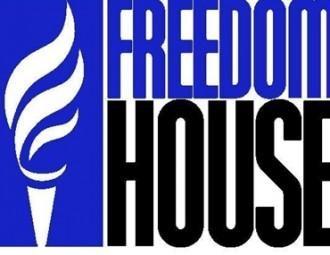Belarus is among the world’s eight worst-rated countries by level of press freedom

Of 197 countries assessed during 2012, a total of 63 were rated Free, 70 as Partly Free, and 64 as Not Free at all. Less than 14% of the world’s inhabitants lived in countries with a free press.
The percentage of the world’s population living in societies with a fully free press has fallen to its lowest level in over a decade, according to a Freedom House report released on May 1, 2013. An overall downturn in global media freedom in 2012 was punctuated by dramatic decline in Mali, deterioration in Greece, and a further tightening of controls in Latin America.
Central and Eastern Europe witnessed modest overall reduction in press freedom during 2012, with deterioration in Azerbaijan and Kazakhstan offset by improvements in Armenia and Georgia. Restrictive conditions persist in Russia, where the relatively unfettered new media, which have somewhat mitigated the government’s near-complete control over major broadcast outlets, faced the threat of further curbs during the year.
The world’s eight worst-rated countries are Belarus, Cuba, Equatorial Guinea, Eritrea, Iran, North Korea, Turkmenistan, and Uzbekistan. In these states, independent media are either non-existent or barely able to operate, the press acts as a mouthpiece for the regime, citizens’ access to unbiased information is severely limited, and dissent is crushed through imprisonment, torture, and other forms of repression.
Reasons for decline included the increasingly sophisticated repression of independent journalism and new media by authoritarian regimes; the ripple effects of the European economic crisis and longer-term challenges to the financial sustainability of print media; and ongoing threats from nonstate actors such as radical Islamists and organized crime groups.
“Two years after the uprisings in the Middle East, we continue to see heightened efforts by authoritarian governments around the world to put a stranglehold on open political dialogue, both online and offline,” said David J. Kramer, president of Freedom House. “The overall decline is also a disturbing indicator of the state of democracy globally and underlines the critical need for vigilance in promoting and protecting independent journalism.”
Independent media continued to face severe challenges in a number of environments that were already rated Not Free. Influential authoritarian states such as China and Russia used a variety of techniques to maintain a tight grip on traditional media—including detaining, jailing, or bringing legal charges against critics, and closing down or otherwise censoring outlets—even as they expanded their attempts to control content online.
“Government attacks on journalists, both legal and physical, are often what make the headlines. However, there are a number of less prominent but equally sinister factors behind the erosion of press freedom worldwide. These include the devastating impact of shrinking national economies on struggling independent media outlets, and the activities of nonstate actors with a strong interest in muzzling the press, such as drug traffickers and terrorist groups,” said Karin Karlekar, project director of Freedom of the Press.
You can read the whole report here.
-
03.01
-
07.10
-
22.09
-
17.08
-
12.08
-
30.09








































